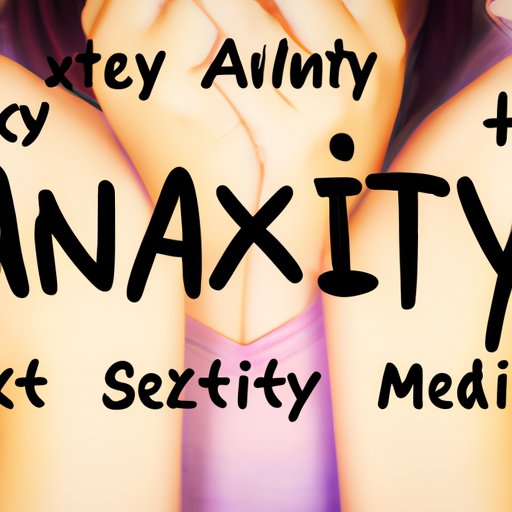
I. Introduction
Anxiety is a common mental health issue that affects millions of people worldwide. It often comes with physical symptoms, such as rapid heartbeat, muscle tension, and sweating. If left untreated, physical symptoms can cause additional stress and discomfort, making it even more challenging to manage anxiety. This article explores different ways to alleviate the physical symptoms of anxiety naturally, including various remedies, practices, and lifestyle adjustments.
II. 5 Natural Ways to Soothe Physical Symptoms of Anxiety
Natural remedies can help alleviate anxiety symptoms without the use of medication. Here are five natural ways to soothe physical symptoms of anxiety:
A. Deep breathing: Taking deep breaths from your diaphragm can be calming and lower your heart rate, reducing anxiety’s physical manifestations.
B. Progressive muscle relaxation: This technique entails tensing and relaxing muscle groups throughout the body to promote relaxation.
C. Aromatherapy: Essential oils like lavender and chamomile can promote relaxation and reduce anxiety symptoms.
D. Herbal supplements: Some herbs, like valerian root and passionflower, have a calming effect and can help alleviate anxiety symptoms.
E. Exercise: Exercise can relieve muscle tension and increase the body’s release of endorphins, which can improve mood.
F. Conclusion: Natural remedies offer an alternative or complement to medication for anxiety treatment, and their benefits are worth exploring.
III. From Fidget Spinners to Calming Scents: Quick Fixes for Anxiety Symptoms
Quick, easy fixes are ideal when managing anxiety symptoms in a hurry. Here are a few quick solutions for physical discomfort:
A. Sensory tools, such as fidget spinners or stress balls, can offer some relief and can be used discreetly.
B. Herbal tea: Some teas, such as chamomile tea and lemon balm tea, have a calming effect and can help alleviate anxiety symptoms.
C. Yoga poses: Certain yoga poses, such as child’s pose and corpse pose, are soothing and can help promote relaxation.
D. Calming scents: Scents like lavender and eucalyptus can promote relaxation and reduce anxiety symptoms when used in soaps, candles, or oils.
E. Conclusion: Quick fixes are not meant to replace more long-term solutions, but they are helpful tools for temporarily relieving anxiety symptoms.
IV. The Power of Mindfulness Techniques in Reducing Anxiety Symptoms
Mindfulness techniques can help reduce anxiety symptoms by promoting relaxation and focusing on the present moment. Here are some mindfulness techniques to try:
A. Body scans: Body scans involve focusing on each body part consciously and scanning for tension, relaxing each part in turn.
B. Guided meditations: Audio recordings can help guide your meditation to focus on relaxation and healing.
C. Visualization exercises: Imagine a peaceful and calming scene in your mind, like a beach or a forest. These types of visuals can help promote relaxation.
D. Conclusion: Mindfulness techniques are scientifically supported to help reduce anxiety symptoms and can be applied by anyone.
V. Stress-Free Workouts: Physical Activity as a Means to Relieve Anxiety Symptoms
Physical activity can help alleviate anxiety symptoms by promoting endorphins’ release, reducing muscle tension and keeping the body fit. Here are some exercises to try:
A. Low-impact exercises like walking or yoga are ideal for people with mobility issues or who are just getting started.
B. High-intensity cardio: HIIT, or high-intensity interval training, can increase endorphin levels and burn calories, relieving anxiety-related tension.
C. Weightlifting: Regular weightlifting can help improve mood and reduce stress levels.
D. Conclusion: Any type of physical activity that suits your fitness level can make a massive difference when it comes to alleviating physical symptoms of anxiety.
VI. Mind the Body: Ways to Relieve Anxiety Symptoms through Self-Care
Self-care involves ensuring our bodies get the rest and relaxation they need to perform optimally. Here are some tips:
A. Bubble baths: Immersing yourself in warm water can promote relaxation and ease muscle tension.
B. Massages: Similarly, massages can help relax muscles and improve circulation, promoting relaxation.
C. Healthy foods: Eating a healthy diet with enough greens, protein, and healthy fats can reduce anxiety symptoms and boost energy levels.
D. Getting enough rest: Ensuring enough sleep and rest are critical to maintaining good mental and physical health.
E. Skincare regimens that promote relaxation, like facial masks and massages, can be an excellent complement to self-care for those who enjoy pampering themselves.
F. Conclusion: Self-care can be fundamental in managing anxiety symptoms by promoting well-being and reducing physical discomfort.
VII. Conclusion
Summary: Physical symptoms of anxiety can take a significant toll on our daily lives. By exploring natural remedies, quick fixes, mindfulness techniques, exercise, and self-care, we can find a personalized approach that can help alleviate our symptoms.
Call to action: If you experience anxiety symptoms, try a new technique today and see which works best for you. Incorporating a range of methods into your daily life is ideal for managing anxiety symptoms. By focusing on self-care, promoting relaxation, and healthy habits, we can lead a happier, healthier life.
Closure: Reducing physical symptoms of anxiety promotes not only physical but mental well-being. By taking a holistic approach to managing anxiety symptoms, we can live life to the fullest, both mentally and physically.





